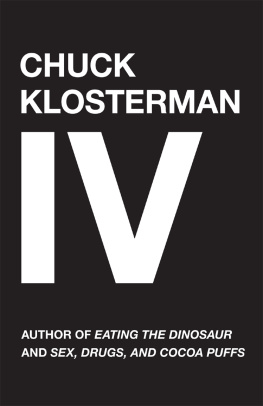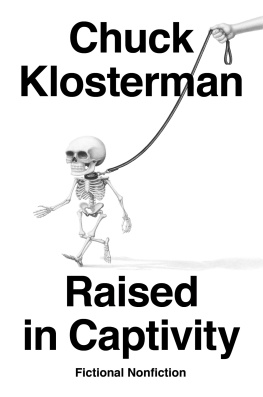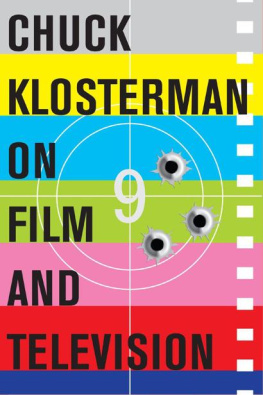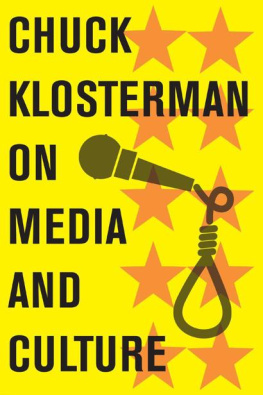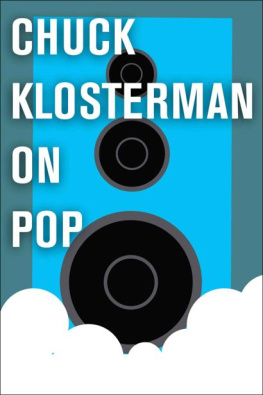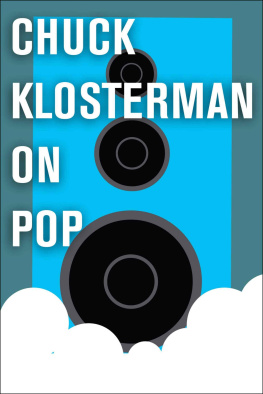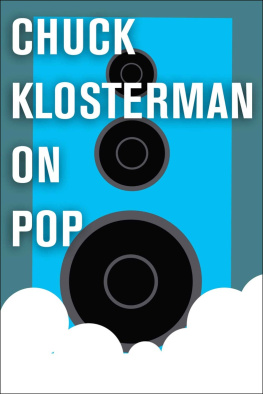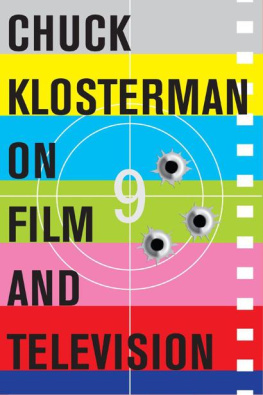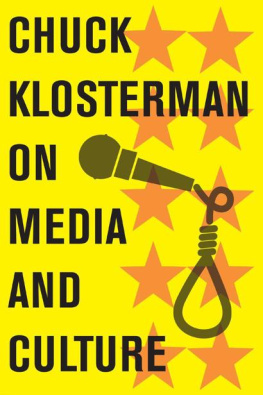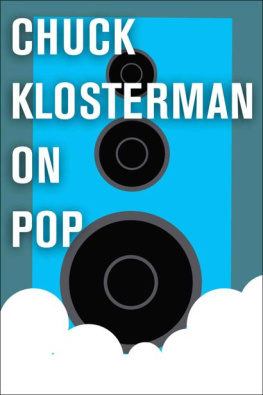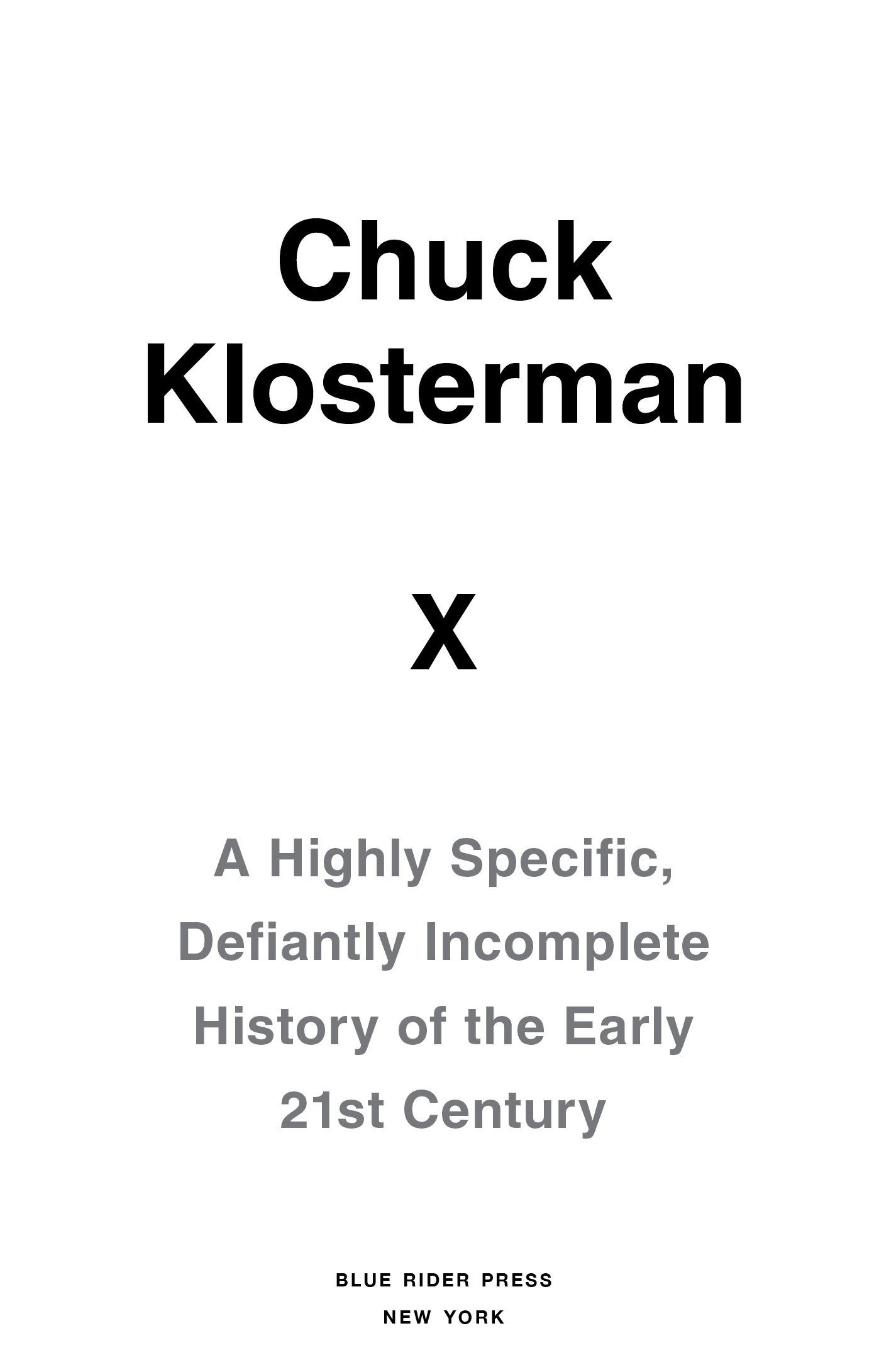Also by Chuck Klosterman
NONFICTION
Fargo Rock City: A Heavy Metal Odyssey in Rural North Dakota
Sex, Drugs, and Cocoa Puffs: A Low Culture Manifesto
Killing Yourself to Live: 85% of a True Story
Chuck Klosterman IV: A Decade of Curious People and Dangerous Ideas
Eating the Dinosaur
I Wear the Black Hat: Grappling with Villains (Real and Imagined)
But What If Were Wrong? Thinking About the Present As If It Were the Past
FICTION
Downtown Owl
The Visible Man

An imprint of Penguin Random House LLC
375 Hudson Street
New York, New York 10014

Copyright 2017 by Chuck Klosterman
Penguin supports copyright. Copyright fuels creativity, encourages diverse voices, promotes free speech, and creates a vibrant culture. Thank you for buying an authorized edition of this book and for complying with copyright laws by not reproducing, scanning, or distributing any part of it in any form without permission. You are supporting writers and allowing Penguin to continue to publish books for every reader.
constitutes a continuation of this copyright page.
Blue Rider Press is a registered trademark and its colophon is a trademark of Penguin Random House LLC.
Ebook ISBN 9780399184178
Version_1
Contents
T he book you are about to read is a collection of stories Ive published in various media outlets over the past ten years. I like these stories and wouldnt republish them if I didnt. But I certainly hope you like them more than I do. The process of compiling old articles is not difficult, but it also isnt pleasant. Its just not enjoyable to reread things youve written in the not-so-distant past (I think this is true for most writers, discounting those real crazy motherfuckers who believe the world would be radically different if they werent involved). Every positive memory is coated with the ooze of regret: You want to delete every semicolon and alter every joke. Moments that once seemed revelatory now seem banal. Youre forcibly reminded how rapidly society evolves, and its disheartening to revisit an arbitrary event from five years ago that suddenly feels like a factoid from 1958. Its the worst kind of time machine.
Yet I must admit something else here, even though it will make me seem like a megalomaniac: I love reading the index to any book I publish. Its always my favorite part. Exploring the index from a book you created is like having someone split your head open with an axe so that you can peruse the contents of your brain. Its the alphabetizing of your consciousness. Sometimes I will pick up one of my old books and sing a random section of the index to the tune of Billy Joels We Didnt Start the Fire, purely for pleasure. (Actually, Im lying. I dont sometimes do this. I did this once, just now, simply to see if it would work, solely for the purposes of writing this introduction. There was no pleasure involved and Ill never do it again. I dont even like making this joke. But the experiment was successful, so feel free to try this at your leisure. In fact, try it a hundred times, even if you dont really remember the original song. Im sure all the people in your life will love it.)
I only note this indexical preoccupation as a warning to you, the consumer: This book is deceptive. It is not as panoramic as it appears. Taken at face value, its index suggests an anthology about many divergent topics (wizards, chemical weapons, Donald Trump, Thai sandwiches, et al.). Andtechnicallythat diversity is real. Those references do exist. There are stories in this collection about literature and zombies and postmodern television and the essentialism of Charlie Brown and the capricious nature of our illusionary universe. One could even argue that the only reason any interesting story is interesting is because its not actually about whatever it superficially appears to suggest, and that the only significant purpose of text is to provide a superstructure for subtext (which always matters more). All of that is true. But heres the dealI wrote these stories. I know what these stories are about. And almost all of them are about one of two things: music or sports. Consumed in aggregate, this omnibus equates to a short book about music, a short book about sports, and a short book about everything else that could possibly exist.
It is not a portrait of what the world is, or of what the world could be.
It is a portrait of my interior life: I watch games, I listen to music, and I daydream about the rest of reality.
When I started as a reporter in the early nineties, there was an incontrovertible firewall between music culture and sports culture, spawned (I suspect) from dark memories various members of the music community still carried from high school. There was this ingrained Reagan-era belief that jocks and meatheads terrorized punks and goths and miscellaneous longhairs, and that the type of alienated teenager who liked art had a condescending view of the type of teenager who liked football. Now, Im sure some of that social derision was authentic. Im sure that negative experience did happen to somebody, and it was certainly baked into every teen movie of the era. But nothing like that ever happened to me. I was obsessed with music and I was obsessed with sports, and the synthesis never seemed uncomfortable. I suppose its possible my hometown was just too small to have stereotypical cliques. Its also possible I was so emotionally engaged with both concepts that I couldnt feel anything else. Maybe the estrangement went over my head. Maybe I was just too dumb to care. Still, I knew this conflict existed for other people, even if I didnt relate to it or understand why. I knew that people who wrote about music rarely wrote about sports, unless they werent especially serious about either. It seemed like you had to choose one or the other. I went to college in 1990 and started my career as a sportswriter. One of the first beats assigned to me was collegiate wrestling, a subject I knew nothing about. I didnt even fully understand the scoring system, so I just described every match like a correspondent for National Geographic. Every single story included the phrase catlike quickness. My only memory of covering wrestling is comparing humans to animals.
In 1994, craving the facade of legitimacy (and maybe the potential access to drugs), I switched over to culture journalism. I wanted to generate theories about why the guys in Anthrax wore shorts, and this was the only way. Once I made the switch, I didnt write another sports story for five years. Im not sure any traditional newspaper editor would have let methe fact that I was interested in Radiohead somehow annihilated the possibility that I could be equally informed about Scottie Pippen.
But this imaginary war eventually ended, at least for me. At some point, I stopped caring about this nonproblematic problem. I just started writing about sports and music at the same time, occasionally in the same article. I haphazardly jammed them together, even when they barely fit. And to my mild surprise, everyone else decided this was okay. As it turns out, the divide between music and sports had dissolved during the nineties, so slowly and incrementally that no one even noticed. Pearl Jam named their first album after NBA point guard Mookie Blaylocks jersey number. Power pitcher Randy Johnson became an arena rock photographer. Members of Pavement and Sleater-Kinney joined fantasy leagues with members of Quasi and Built to Spill. Master P played in the CBA. Public Enemys liner notes made reference to Pooh Richardson. Drew Bledsoe jumped off the stage at an Everclear concert and injured a female spectator. All the coked-up Britpop dudes refused to shut up about Manchester United. Or was it Man City? Ive already forgotten. But by the time the twenty-first century started, the notion of being a rock critic


